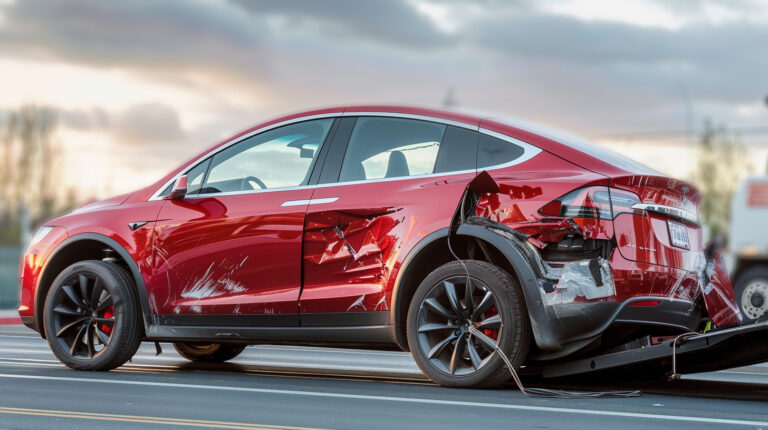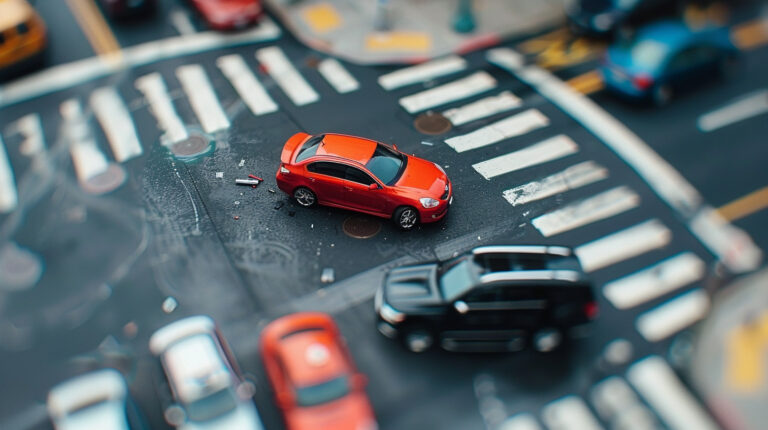After an accident, many people are faced with the question: "Do I have my vehicle repaired or do I buy a new car?" They are quickly confronted with terms such as total loss, residual value, replacement value and replacement cost. It is important to categorise all these terms and put them in the right context. It all sounds complicated, but it doesn't have to be for you. We'll show you what you need to know.
What is a technical and what is an economic total loss?
In order to answer this question, it is first necessary to clarify what the terms "replacement value", "residual value" and "replacement cost" actually mean:
The replacement value corresponds to the amount that would have to be paid to obtain an equivalent vehicle. The replacement value of a car is therefore the cost of replacing the damaged vehicle with an equivalent one.
This is the value of the vehicle after a car accident in its unrepaired condition.
This refers to the actual cost of replacing a comparable vehicle. This results from the Replacement value less residual value.
These terms can now be used to explain the conditions for an economic and technical total loss in more detail. This is because it is a technical total lossif it is no longer possible to repair the vehicle. In concrete terms, this means that the residual value determined by the expert is zero euros.
If the vehicle is damaged to such an extent that the estimated cost of repair is higher than the replacement value, then it is a real total loss.
But what is a non-genuine total loss? Here one speaks of economic total loss. This is because the repair costs are still below the replacement value, but above the difference between the replacement value and the residual value.
The difference between the replacement value and the residual value is called the replacement cost. The replacement value is the amount you would have to spend to buy a vehicle of the same type and quality as your old car at the time of the accident. The residual value is the value that your vehicle now has after the accident with the accident damage.
You don't know whether your car is a technical or economic total loss after an accident? How to proceed with the vehicle involved in the accident? We will be happy to help you. The experts from our network will check all claims to which you are entitled after a road traffic accident and will take care of all the steps for your best possible claims settlement.
Accident victims in your situation simply get the best support from fairforce.one.
Does a total economic loss have disadvantages?
In the case of a total loss, the question arises as to how a non-genuine and genuine total loss are to be calculated.
Here is a small example of an economic total loss calculation:
Purchase of an equivalent vehicle (replacement value) = EUR 10,000
A true total loss is when the repair costs exceed the replacement value. In our numerical example, if the repair costs exceed EUR 10,000, this condition is met.
Residual value of the car = EUR 5,000
Calculated repair costs = EUR 6,000 net.
The condition of a genuine total loss is therefore not fulfilled here, but that of an economic total loss (non-genuine total loss) is.
This is because the repair costs of 6,000 euros would be higher than the difference between the replacement value minus the residual value (replacement cost), in this case 5,000 euros.
What does the 130% rule say for a total loss car?
The so-called 130 % rule applies as a special regulation. In the event of a no-fault accident, it protects the Interest in integrity of the injured party. This refers to the injured party's interest in preserving their assets. The rule can be considered both in the case of a genuine total loss and in the case of an economic total loss - but only in the case of a third-party liability claim. This special rule does not apply in the case of comprehensive damage! In this case, the upper limit for the repair costs is the replacement value of the vehicle.
The 130 % rule allows the injured party to keep their damaged vehicle if the cost of repair is no more than 30 % above the cost of replacement. This means that you can claim up to 130 % of the replacement cost as compensation if your car can be restored for this amount and you continue to use your car. The so-called will to continue using the car and the Interest in integrity are important prerequisites for the 130% rule.
Example of economic total loss, keep the car:
Replacement value for an equivalent car = EUR 7,000
Maximum compensation for the repair = €9,100 = 130 % of €7,000 replacement value
If the repair costs exceed the 130 % limit, a maximum amount equal to the replacement value will be paid.
To summarise, you can therefore have your vehicle repaired under the above conditions. If you decide not to have your vehicle repaired, you will receive a Fictitious settlement on a total loss basis.
What additional costs does the insurance company have to pay?
In the event of a technical and economic total loss, the opposing party's liability insurance must also cover the costs of a Rental car to be reimbursed. The insurance company must also reimburse you for the costs incurred for registering and deregistering the vehicle and possibly for disposing of it.
To check which claims you are still entitled to as the injured party in a road traffic accident, simply report your accident to us. The specialists from our network will contact you directly and explain the next steps.
Accident victims in your situation simply get the best support from fairforce.one.
Steps towards the best possible claims settlement
Do you have the feeling that the claims settlement for your road accident is complicated? We shed light on the dark and help you with the complete handling of the claim with our network of specialists.
This is the best way to proceed:
- You can report your accident to us by calling the toll-free number 0800 30 111 60 or simply online.
- An expert from our network will contact you within just 5 minutes to discuss the next steps.
- You take a deep breath and can now lean back, because the specialists from the fairforce.one network will take care of everything else and check your claims after a road accident.
FAQ
What to do if a car is a total loss?
If an accident results in a total loss, many drivers are overwhelmed. As with any accident that is not your fault, the other party's insurance company will take care of everything else. However, depending on the circumstances, you can also decide to have your car repaired and utilise the 130 % rule. We are happy to help and advise you on your options so that you always make the best decision and don't get lost in the jungle of regulation. Just get in touch with us.
learn moreEconomic total loss, then accident again - who pays?
A total loss can only occur once. If you continue to drive your car after such an accident and have another accident, the residual value and replacement value at the time after the first accident apply.
learn moreDoes fully comprehensive insurance pay after economic total loss?
If you caused the total loss yourself and have fully comprehensive insurance, this will intervene and settle the claim. Partially comprehensive insurance, on the other hand, will not do this; you will have to bear the costs of replacement yourself.
learn moreWhen is a car an economic total loss after hail damage?
An economic total loss always occurs when the vehicle is so busy that a repair is no longer economically viable. Although the repair costs are still below the replacement value, they are already higher than the difference between the residual value and the replacement value. As soon as hail damage fulfils these conditions, it is an economic total loss.
learn moreWhen is my car an economic total loss?
In the event of an economic total loss, the repair costs are lower than the replacement value. However, the difference between the repair costs and the replacement value is higher than the repair costs. Therefore, a repair is not economically viable.
learn more




